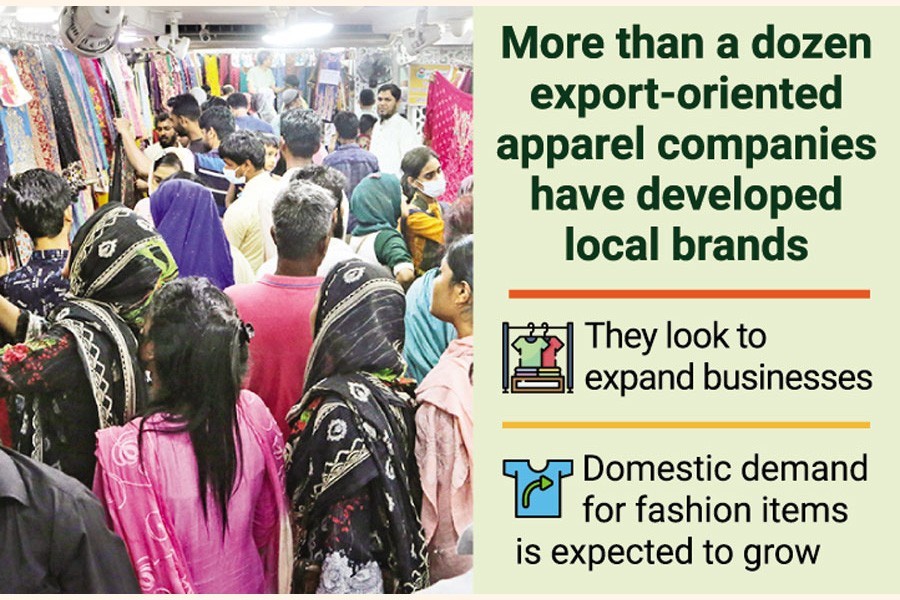Local businesses of export-oriented apparel makers bounced back on the domestic retail market by banking on strong demand ahead of Eid festival.
The sales boom would help the apparel exporters recover from the fallouts from the Covid-19 pandemic that upended global supply chains, industry people said, reporting that they were receiving 'tremendous' response from the local customers.
More than a dozen export-oriented readymade garment manufacturers having their own local brands and outlets are now witnessing a huge rush of customers ahead of this holy occasion - unlike previous four Eids and two Bangla New Year festivals (Pahela Baishakh) overshadowed by the pandemic.
These brands are focusing on the local market more now than any time before due to the growing demand for fashion wear and adding value to the local market, said the insiders.
The companies have supplied apparel items to the western buyers like H&M, Inditex, Target, Walmart, JC Penny and Marks & Spencer for decades.
Talking to the FE, Evince Group Director Shah Rayeed Chowdhury said 'Noir" is their local brand, and that they had to display even their Eid-ul-Azha collection during this Eid-ul-Fitr season as their outlets ran out of stock.
Terming the Eid sales 'phenomenal', he said the response from customers was "very good and beyond expectations".
The group that took over Japanese lifestyle products retailer Miniso in Bangladesh in 2019 was also doing better, he said, adding that Miniso BD is operating under a franchise business model.
Miniso BD has 17 stores - seven owned by Evince Group and the rest 10 owned by the franchise.
Another local brand, 'Sara', owned by export-oriented Snowtex, is also witnessing a sales boom during this high season.
When asked, SM Khaled, managing director of Snowtex, said: "Customer response is very good. There is a huge rush in all our eight stores as compared to the last two years."
Snowtex, with an annual US$250 million turnover, manufactures woven items like outerwear and sportswear, and exports those to European and other countries including Canada and Japan.
Mr Khaled said Sara did not incur any financial loss during the last two years despite the pandemic. The profit was not at its desired level, however.
They made profit even in 2020 when the pandemic severely affected overall export earnings and local businesses, he said, adding that his company shared the profit among the workers accordingly.
Explaining the success, he said that their more than 20 years of experience in apparel-material sourcing, production and exports helped them navigate the difficulties during the period.
"These experiences have also helped develop local brands with quality and fashionable products at competitive prices for the local consumers," added Mr Khaled.
His company also gathered knowledge from their foreign buyers who are used to managing their respective retail businesses.
He, however, feels that the price of their local products would further decrease once they are able to raise the number of stores and scale of production.
Like Snowtex, Dekko Group and Energypac had also launched their own local brands namely 'Klubhaus' and 'O-Code' respectively before the pandemic while few others, including Team Group's Twelve and Evince Group's Miniso Bangladesh, are expanding their local businesses.
Companies such as Beximco, Giant, Epyllion, Babylon, Amber, Pride Group, Milon Garment, Smart Jeans Ltd have already made their footprint on the domestic market.
These companies have gained popularity under the brand names Yellow, Texmart, Sailor, Trendz, Amber Lifestyle, Pride, Artisti, Bar Code and Shoishab respectively.
Talking to the FE, Abdullah Hil Rakib, managing director of Team Group, also echoed that "2022 Ramadan looks good in terms of business" and termed 2022 a year of bounce-back.
Terming 2020 and 2021 'nightmare', he said there was literally no sale as they lost the major occasions. He expected to recover the losses incurred during the last two years by 2024.
At present, the group has 34 shops under the brand name Twelve and plans to increase the number to 60 by 2025.
Mr Rakib says they want to capitalise on the technology, experience, fashion sense and fashion-design team for the international market to grow their footprint on the local market by blending ethnic and international taste.
Also a director of Bangladesh Garment Manufacturers and Exporters Association (BGMEA), he sees huge potential and explains that the local market would become a reasonably big one by 2030 with the country's graduation and people's increased purchasing capacity.
He, however, stressed the need for copyright protection of the local brands to be able to do proper business by setting up joint ventures with international brands to offer fashion at affordable prices.
Munni_fe@yahoo.com


